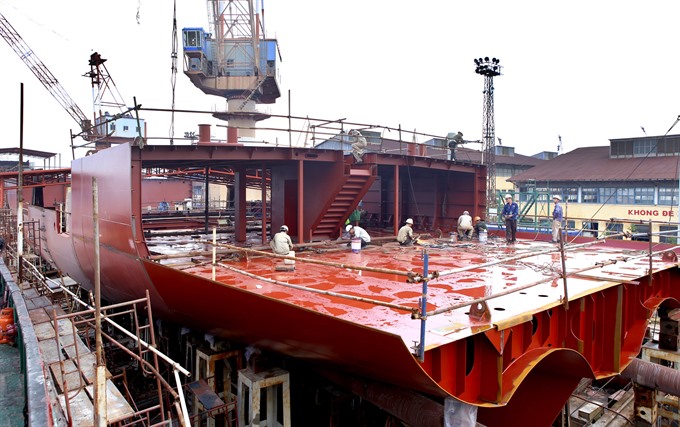 Economy
Economy

The nation’s mechanical sector need radical reform despite its recent progress in quality and output, experts and policymakers agree.
 |
| A seafaring ship is being built at the Hạ Long Shipbuilding One Member Co. Ltd., a member company of the State-owned Shipbuilding Industry Corporation. - VNA/VNS Photo Hoàng Hùng |
THÁI NGUYÊN — The nation’s mechanical sector need radical reform despite its recent progress in quality and output, experts and policymakers agree.
The consensus was expressed during a scientific workshop on future development of the mechanical sector held on Thursday in the northern province of Thái Nguyên, a location famous for rich minerals and robust mining activities.
The workshop reaffirmed the mechanical sector’s critical role in the country’s modernisation and industrialisation efforts, and sought to identify obstacles and weaknesses hindering its growth.
Participants also discussed appropriate policies to unleash the sector’s full potential.
According to reports by the mechanical sector’s business association and the Ministry of Industry and Commerce, in 2006-2015, total output grew 342 per cent and the sector has constantly managed to account for 31-32 per cent of the country’s GDP.
Currently, there are some 14,800 businesses in the sector, mostly small-scale. Just 12 businesses employ more than 5,000 people and 116 have more than 1,000 workers. Nearly 100 businesses have a charter capital of over VNĐ 500 billion (US$22.05 million).
Several achievements
Experts said that in general, the sector has registered several achievements, with many businesses now capable of designing, making, and integrating fully automated assembly lines, or being able to produce road and marine vehicles, in addition to several improvements in metallurgy and metal casting.
Several industries have been established, including manufacture and assembly of steel structures, shipbuilding, manufacture and assembly of automobiles and motorcycles, manufacture of engines and agricultural machinery, electrical equipment, spare parts and household goods.
However, experts warned that mechanical plants were still operating at a “Industry 2.0 level” while the world is getting well into the fourth industrial revolution, making it hard for sector to create infrastructure “for the country’s ambition of achieving autonomy in energy, traffic, and construction.”
Furthermore, several of Việt Nam’s mechanical products are not competitive and face high risk of losing out in the domestic market, while the sector’s exports are already floundering.
This situation is compounded by Việt Nam’s participation in the global market chain, leaving much room for improvement. At present, country is only ‘entrusted’ with job orders by international companies.
With just three of 12 pilot projects aiming to effect significant upgrades having begun implementation, and all three still struggling, the targets of the sector being able to supply 45-50 per cent of the domestic demand and export 30 per cent of its output look very unlikely.
Đào Phan Long, general secretary of the association of mechanical businesses, ask the government to review all of the branches that it has been supporting and axe underperformers. He also asked for more support, both in terms of finance, land use and technical assistance, for those investing in high technology and manufacturing competitive products that can replace imported ones.
The association also called on the Government for tax policies and technical barriers to “create a fair investment and business environment between domestic and FDI enterprises.”
The Ministry agreed with several of the association’s proposals, adding that emphasis should be placed on buying and transferring modern technologies and production methods, and developing a credit package for the mechanical sector and supporting industries. — VNS




